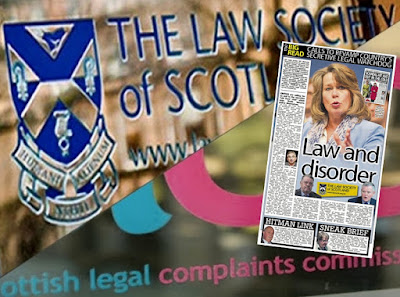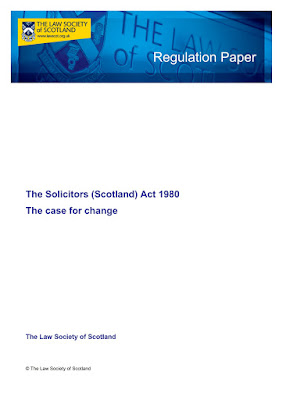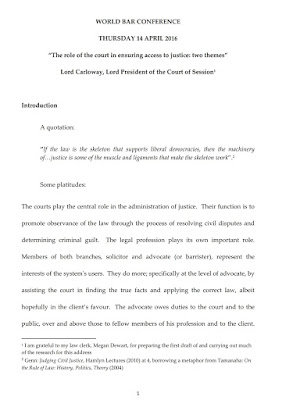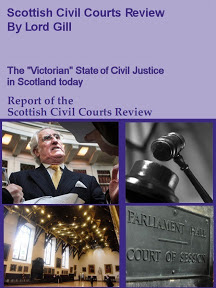 Law Society - new powers to look after lawyers. VESTED INTERESTS tend not to remain silent in an election year, and as the May 2016 Holyrood elections approach, the Law Society of Scotland has proposed the Scottish Parliament give the legal profession even more powers to enable lawyers to look after their own.
Law Society - new powers to look after lawyers. VESTED INTERESTS tend not to remain silent in an election year, and as the May 2016 Holyrood elections approach, the Law Society of Scotland has proposed the Scottish Parliament give the legal profession even more powers to enable lawyers to look after their own.
The Law Society pledges the new legislation – written by the Law Society, amended by the Law Society, and finally, approved for whatever scant debate at Holyrood the Law Society deigns necessary, will enable the Law Society to protect consumers and clients even more so than is currently humanly possible.
The Prospectus for Power - which the Law Society has submitted to Scottish Ministers, sets out the legal profession’s take on a “need for change” including proposals for;
* better regulation of legal firms (‘entity regulation’) in addition to the regulation of individual solicitors to protect consumers,
* new powers to suspend solicitors suspected of serious wrongdoing,
* opening the Law Society’s membership in order to improve standards amongst other legal professionals,
* the ability for the Society to regulate legal work beyond the domestic Scottish jurisdiction in order to provide simpler regulation for cross-border firms,
* more flexible business models which allow legal firms to adapt to market changes.
Better regulation of legal firms - to protect consumers.
This coming just a few short months after Law Society staff were hurriedly arranging press conferences to combat questions over their seedy role in holding down a Crown Office investigation of certain activities carried out by solicitors involved in the Michelle Thomson property scandal – reported in further detail here: CRIME SOCIETY: Law Society of Scotland 'unfit for purpose' as calls grow for Scots solicitors to be stripped of self regulation powers used by lawyers to investigate themselves
Little more has been said of the Crown Office inept handling of the information allegedly passed to it by the Law Society - however, the silence may not be a total surprise, given Scotland’s Crown Office was recently revealed to hold a criminal tendency all of it’s own: CROWN CROOKED: Crown Office crime files reveal Scotland’s Prosecutors & staff charged with Drugs crimes, Police assault, threats & perverting the course of justice
However, we must remember the demands proposals from the Law Society of Scotland should not be taken lightly.
As any experienced Parliament watcher will admit - the Law Society of Scotland have a history of getting what the profession wants at the Scottish Parliament.
Take for instance, the Legal Profession and Legal Aid (Scotland) Act 2007, and the lengthy, at times bitter debate during 2006 - which saw John Swinney call out the Law Society of Scotland’s Master Policy Indemnity Insurance arrangements and the Society’s interference in client compensation claims as dishonest and then some.
The Law Society's then Chief Executive Douglas Mill did not take kindly to the cross examination, and proposals before MSPs to create an independent regulator – the Scottish Legal Complaints Commission (SLCC).
At one point, Mill went so far as to say Holyrood should take a hike – and threated the Parliament with legal action if lawyers were to be robbed of their self given Human Right to look after their own. In the end, it was Douglas Mill who took a hike.
However, in all things legal, nothing is as it seems.
The ‘independent’ Scottish Legal Complaints Commission - created as a result of the 2007 LPLA Act, became little more than a front for the Law Society of Scotland.
The regulator ended up costing clients around £3million a year – paid over and over again out of hikes to legal fees.
As independent regulators go, the SLCC is staffed by former Law Society employees, lawyers, lawyers families, friends, business associates, reported here: 'Independent' Scots legal watchdog consists of solicitors’ husbands, wives, sons, daughters, cousins, friends, & employers.
To crown it all, the Law Society took charge of the ‘independent’ SLCC by appointing one of their own former Directors - Neil Stevenson as the latest Chief Executive of the SLCC.
A truly malevolent definition of ‘independence’ – if ever there was one.
Since the LPLA Act took effect, countless law changes have taken place to allegedly improve the SLCC’s procedures on how it can better regulate the legal profession.
One such change landed Justice Secretary Kenny MacAskill before the Scottish Parliament's Justice Committee to provide Scots legal regulators with similar ‘new powers’ to protect consumers.
Read more on the 2014 legislative effort to create enhanced powers for legal regulators, here: TOXIC LAW: MacAskill gives lawyers ‘right to complain about complaints’
Guess what.The new rules changed nothing. The SLCC is as inept at regulating lawyers in 2016, as it was in 2014 counting backwards to 2008 when the ‘independent’ regulator came into being.
Previous media investigations, reports and coverage of issues relating to the SLCC can be found here: Scottish Legal Complaints Commission - A history of pro-lawyer regulation.
 Prospectus for Power – Law Society of Scotland.
Prospectus for Power – Law Society of Scotland.
Now, in 2016, the Law Society of Scotland claims another round of new legislation is needed to better protect consumers and allow the Scottish legal services market to thrive
Publishing a detailed prospectus which it has presented to the Scottish Government on the need for change, the professional body for Scottish solicitors said the current legislative framework was increasingly out of date and unfit for purpose – about as unfit for purpose as self regulation can ever be.
Discussions have already taken place between the Law Society and the Scottish Government on the legal profession’s legislation wish list for new powers.
Christine McLintock – President of the Law Society of Scotland admitted: “We have had a number of very useful discussions with the Scottish Government and we are grateful to Ministers and officials for being so open to listening to our ideas. We have also worked hard to engage other bodies in the legal sector as well as consumer groups to ensure we work in partnership to deliver real change.
Ms McLintock added: “We obviously need to see the outcome of the Holyrood elections in May and the shape of the new Scottish Government. Whatever the outcome, we will be pushing hard for reform to be an early priority in the new parliament.”
The Law Society’s campaign to give the legal profession new powers includes what the profession claims should be ‘Priorities for the Scottish Parliament’.
This campaign includes a call for Scotland’s political parties to commit to a modern, fit-for-purpose framework for legal services in Scotland which;
* Maintains the advantages of the current system, including the independence of the legal profession, a robust system of co-regulation involving strong professional bodies and an independent complaints handling organisation and discipline tribunal
* Provides a more agile system of consumer protection and addresses the rise of the unregulated legal services market
* Allows flexible regulation that reflects the rise of alternative business models, cross-border firms and internationalisation of the sector
* Enables the Law Society to respond to the changing needs of its members and to open up associate forms of membership to other legal professionals, including paralegals and legal executives
President of the Law Society, Christine McLintock added: “The legal services market is a great Scottish success story. We contribute over £1 billion to the economy each year; account for over 20,000 highly skilled jobs and support many of the other sectors on which Scotland’s economy depends. We have phenomenal legal talent, thanks to our world class universities and a rigorous programme of training and development to deliver high standards.
“Yet the legal services market is going through a dramatic period of change. New expectations from clients, new business models, the growth of cross border legal firms and increased technology are all serving to reshape the market.
“Most of the legislation covering the operation and regulation of the legal market is over 35 years old. It is increasingly outdated for modern legal practice. Whilst some reforms were brought in 2007 and 2010, the whole framework can be confusing and, in some cases, contradictory.
“There are important elements and principles which should be preserved. The independence of the legal profession. A single professional body for solicitors. Independent complaints handling and discipline bodies. These are important and should be protected. However, there is a case for new, flexible and enabling legislation which helps the legal services market in Scotland to thrive, which continues to ensure standards remain high and which better protects consumers when things do go wrong.”
The Law Society of Scotland says it now plans to engage with political parties, consumer groups and others in the legal sector to build a consensus in favour of change with an aim of getting a new Bill introduced early in the new term of the Scottish Parliament.
However, in England & Wales, the public mood is for fully independent regulation of the legal profession, as was recently reported here: A QUESTION OF TRUST: Should solicitors be independently regulated? UK public say “Yes” - according to research conducted by the Solicitors Regulation Authority
Remember to add your own voice when any such proposals eventually reach the Scottish Parliament.







